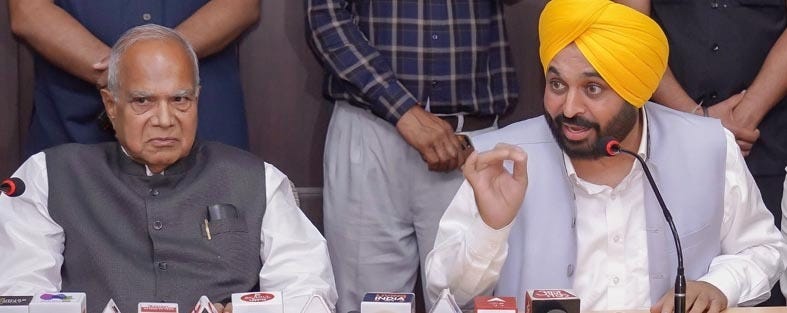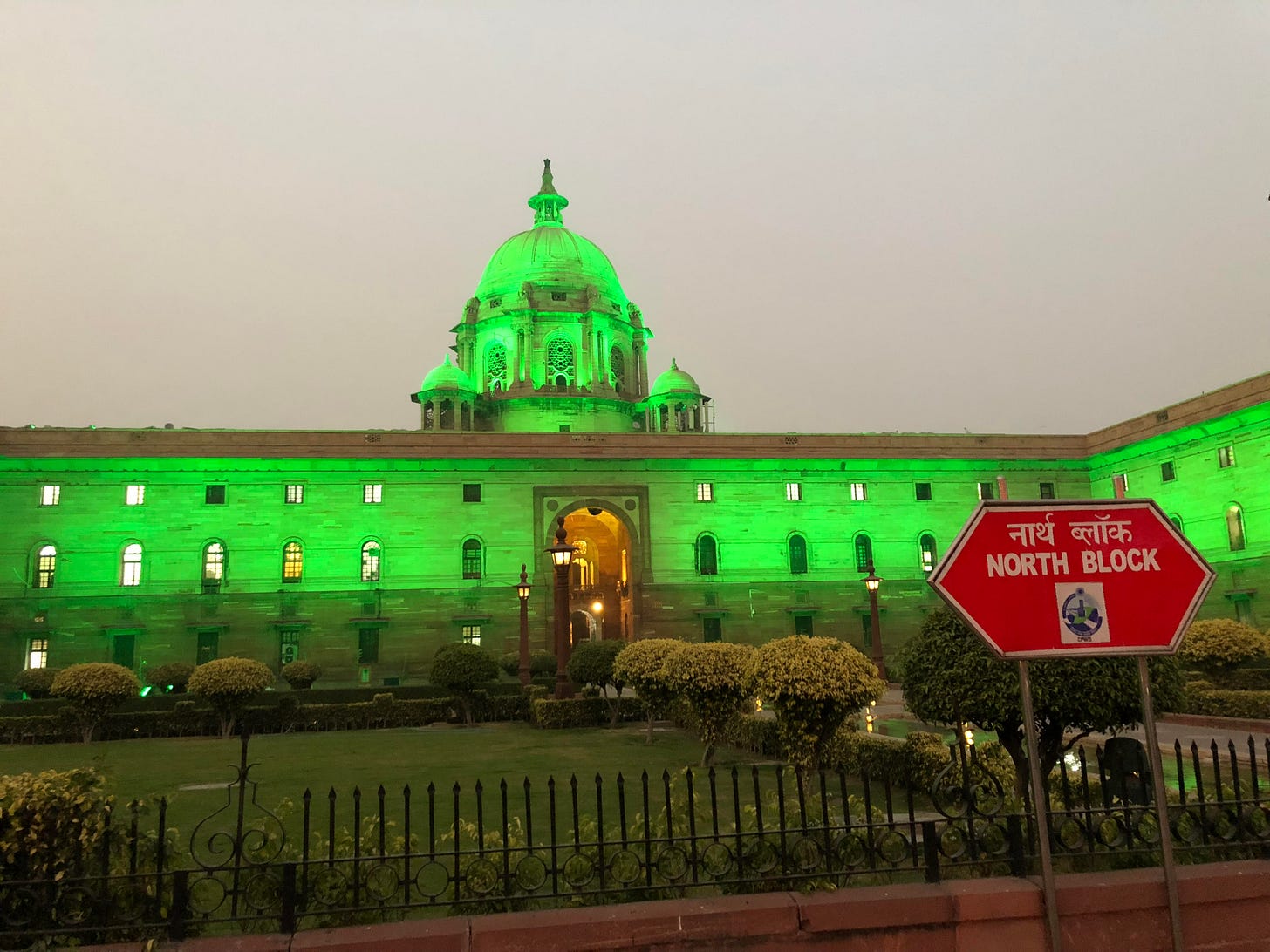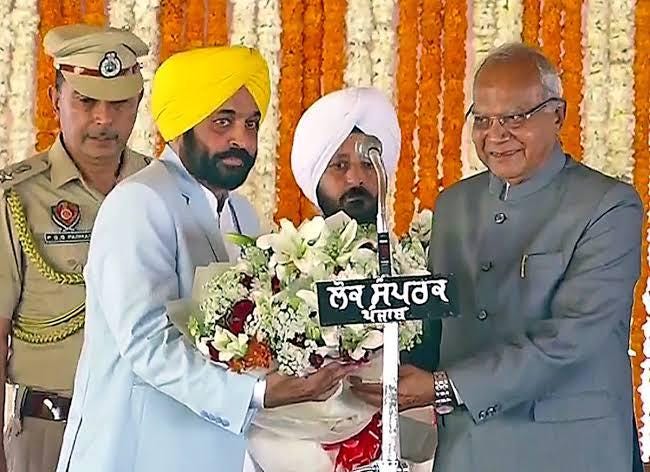Supreme Court Calls for Prompt Decisions by Governors on Bills Passed by Legislature
"Governors should not be oblivious of the fact that they are not elected authorities", CJI stated.
Introduction
In a significant verbal observation, the Supreme Court of India today expressed concern over the trend of Governors withholding assent to State Bills, passed by the Legislature, until judicial intervention was sought. The Apex Court's remarks underline the imperative for constitutional functionaries to act timely and uphold democratic ethos.
Supreme Court's Stern View on Governors' Inaction
On November 6, the Supreme Court voiced its concern over the recurrent phenomenon where State Governments are compelled to seek judicial recourse for Governors to act upon legislature-passed Bills. The Bench, headed by Chief Justice DY Chandrachud, expressed its disappointment regarding the Governors' delayed responses until matters are escalated to the judiciary.
Punjab's Plea Sheds Light on Constitutional Impasse
Today’s hearing of a writ petition from Punjab showcased the pressing issue. Punjab was aggrieved by Governor Banwarilal Purohit's inaction on seven pivotal Bills1. During the proceedings, the Solicitor General of India indicated that the Governor had made decisions on some of the Bills, promising detailed communication by the week's end.
The Constitutional Dilemma and Governance Hurdles
Senior Advocate Dr. Abhishek Manu Singhvi, representing Punjab, lamented the impact of this inaction on governance. He highlighted significant bills, including those concerning fiscal management and Gurdwara administration, that remained in limbo due to the Governor's inaction. The Court also scrutinized the convening process of the legislative assembly, probing the constitutional validity of sessions' scheduling, centring around the difference between adjourning the House sine die and proroguing it.
The CJI's Call for Self-Reflection and Democratic Maturity
CJI Chandrachud's remarks were a call to action for both the Government and the Governor to engage in introspection. The Chief Justice emphasized the need for amicable resolutions between the Chief Minister and the Governor to uphold India's democratic traditions.
Parallel Concerns Across States
The issue transcends Punjab; similar grievances were shared by Kerala, Telangana and Tamil Nadu, with their respective petitions to be reviewed shortly. The hearing brought forth the nuances of the constitutional relationship between State Governors and the Legislature, especially concerning Bills' assent.
The Backdrop of Constitutional Discord
The backdrop involves the Punjab Governor's reservation in assenting to several bills, including those on fiscal responsibility and tax amendments. The Governor's contention over the legality of the legislative session posed significant constitutional queries, prompting the Punjab Government to curtail a ‘Special Session’.
Conclusion: The Imperative for Constitutional Fidelity
The Supreme Court's sagacious advice reflects the urgency for Governors to act without judicial prodding, ensuring smooth legislative processes. As cases from multiple states converge, it becomes clear that the judiciary seeks to reinforce the constitutional duties of Governors, advocating for the uninterrupted operation of democratic governance, in accordance with the letter and spirit of the Constitution.
==========================================================================
Case Reference
The commentary stems from the case titled "The State of Punjab v Principal Secretary to the Governor of Punjab And Anr. W.P.(C) No. 1224/2023", that was heard today. The case has become emblematic of the broader constitutional discourse on gubernatorial conduct and legislative efficacy in India.
NB
Please note, at the time of this article's publication, the Supreme Court's formal written orders had not been uploaded, nor was there any notification regarding the subsequent date of hearing.
Addendum of Constitutional Provisions
Article 200
Once a Bill is passed by the State Legislature, it goes to the Governor for assent under Article 200 of the Constitution of India.
The process outlined in Article 200 is as follows2:
When a Bill has been passed by the Legislative Assembly of a State, or, in the case of a State having a Legislative Council, has been passed by both Houses, it shall be presented to the Governor and the Governor shall declare either that he assents to the Bill, or that he withholds assent therefrom: Provided that the Governor may, as soon as possible, reserve the Bill for the consideration of the President; and the President shall declare either that he assents to the Bill, or that he withholds assent therefrom.
Where a Bill is reserved by the Governor for the consideration of the President, the President shall declare either that he assents to the Bill, or that he withholds assent therefrom, provided that, where the Bill is not a Money Bill, the President may direct the Governor to return the Bill to the House or Houses of the Legislature of the State together with such a message as is mentioned in the first proviso to article 201 and the House or Houses shall reconsider the Bill accordingly within a period of six months from the date of receipt of such message and if it is passed again by the House or Houses with or without amendment and presented to the Governor for assent, the Governor shall not withhold assent therefrom: Provided further that the President may, if he is satisfied that circumstances exist which render it necessary for him to take immediate action, direct the Governor to promulgate such a Bill as an Ordinance.
The Constitution does not specify a fixed timeframe within which the Governor must act on a Bill presented for assent. This can lead to situations where a Bill may remain with the Governor for an extended period before a decision is taken.
When a Bill is presented to the Governor after being passed by the state legislature, the Governor has several options:
Assent to the Bill: The Governor can assent to the Bill, after which it becomes an Act and is entered into the statute book.
Withhold Assent: The Governor can withhold assent, effectively vetoing the Bill.
Reserve for President's Consideration: The Governor can reserve certain Bills for the President's consideration, especially if it is deemed to be constitutionally controversial or against the provisions of the Constitution and law.
Return for Reconsideration: If the Bill is not a Money Bill, the Governor can return it to the Legislature requesting reconsideration of the Bill or any specific amendments. However, if the Bill is passed again by the Legislature with or without amendments and presented again to the Governor, it is obligatory for the Governor to give assent to it.
The options available to the Governor ensure that there is a system of checks and balances in the legislative process of the state, enabling a higher degree of scrutiny for laws that could have significant implications.
Elucidation of the “Explanation” to Article 200
Certainly. Let's break down Article 200 and the 'Explanation' clause into simpler terms:
When the State Legislature (which could be a unicameral body, the Legislative Assembly, or a bicameral body including both the Legislative Assembly and Legislative Council) passes a Bill, it is sent to the Governor of the state.
Upon receiving the Bill, the Governor has a few choices:
Give assent (approval), and the Bill then becomes a law.
Withhold assent (disapproval), effectively vetoing the Bill.
Reserve the Bill for the President of India's consideration, particularly if there are legal or constitutional concerns.
The 'Explanation' in Article 200 refers specifically to Money Bills. Here's what it means:
When the State Legislature passes a Money Bill, it has to be sent to the Governor within fourteen days.
The Governor cannot withhold assent to a Money Bill. They must either:
Assent to the Money Bill, allowing it to become law.
Send the Money Bill back to the Legislature asking for reconsideration (suggesting changes).
If the Governor sends a Money Bill back with suggestions, the Legislature must consider it again and may pass it with or without amendments.
Once the Legislature has passed the Bill again and sent it back to the Governor, the Governor cannot withhold assent and must forward it to the President within fourteen days.
Ultimately, for Money Bills, the Governor acts more as a conduit for ensuring procedural compliance rather than as a check or balance, as they do not have the power to veto Money Bills.
In summary, the 'Explanation' part of Article 200 clarifies the Governor's role regarding Money Bills, which is more limited compared to other types of legislation, and outlines the specific, shorter timelines for handling Money Bills.
Governor vs. CM: The Punjab Power Play
The Dissonance in Punjab Politics The most recent four-page letter from the Governor of Punjab to the Punjab Chief Minister, dated 25th August 2023, has stirred considerable discussions in political, academic, and media circles. It's not just the possibility of invok…
Article 200: Assent to Bills
When a Bill has been passed by the Legislative Assembly of a State or, in the case of a State having a Legislative Council, having been passed by both Houses of the Legislature, it shall be presented to the Governor and the Governor shall declare either that he assents to the Bill, or that he withholds assent therefrom:
Provided that the Governor may, as soon as possible, reserve the Bill for the consideration of the President; and the President shall declare either that he assents to the Bill, or that he withholds assent therefrom.
Explanation: The foregoing provision of this article shall not apply to a Money Bill. In the case of a Money Bill, the Governor shall, within a period of fourteen days from the date of its presentation to him, either assent to the Bill or reserve it for the consideration of the President; and shall, within the said period, return the Bill to the House or Houses of the Legislature of the State with a message requesting that the House or Houses will reconsider the Bill or any specified provisions thereof and, in particular, will consider the desirability of introducing any such amendments as he may recommend in his message, and, when the Bill is sent back to him by the House or Houses with or without amendment, the Governor shall, not later than fourteen days from the date of receipt of the Bill, declare either that he assents to the Bill, or that he reserves the Bill for the consideration of the President.











